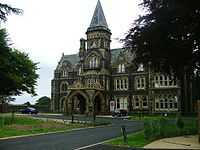Arthur Dorman
| Sir Arthur John Dorman KBE | |
|---|---|
|
Bromide print by Walter Stoneman for National Portrait Gallery, London | |
| Born |
8 August 1848 Ashford, Kent, England |
| Died |
9 February 1931 (aged 82) Nunthorpe, Middlesbrough, England |
| Nationality | British |
| Citizenship | Great Britain |
| Education | Christ's Hospital, West Sussex. |
| Parent(s) | Charles Dorman, Emma Page |
|
Engineering career | |
| Engineering discipline | Industrialist, Dorman Long |
Sir Arthur John Dorman, 1st Baronet KBE (8 August 1848 – 12 February 1931) was an important British industrialist.
Early life
He was born at Ashford in Kent the son of Charles Dorman and Emma Page and educated at Christ's Hospital, West Sussex.
Career
He was sent, at the age of 22, by his family to work at a Stockton-on-Tees iron works where a relative was a partner. Dorman started as a puddler and rapidly progressed in his career. In 1875 he went into partnership with Albert de Lande Long to acquire the West Marsh Ironworks in Middlesbrough.[1] During the 1880s they exploited the new steel making technologies being introduced at that time including use of Open hearth furnaces.[1] Together they built a large industrial concern, Dorman Long, which by 1914 employed 20,000 people and during the World War I was a major supplier of shells.[1]
Arthur Dorman was made a KBE in 1918[1] and a baronet in 1923.[2]
Family

He married Clara Lockwood in 1873 and together they had four sons and three daughters.[1] His youngest son George Lockwood Dorman was killed in the Second Boer War, and is commemorated in the Dorman Museum.
Sir Arthur Dorman died in 1931 at Grey Towers, his home in Nunthorpe[1] near Middlesbrough. His title was inherited by his eldest son Bedford Lockwood Dorman.
References
External links
| Baronetage of the United Kingdom | ||
|---|---|---|
| Preceded by New creation |
Baronet 1923–1931 |
Succeeded by Sir Bedford Lockwood Dorman |
.jpg)